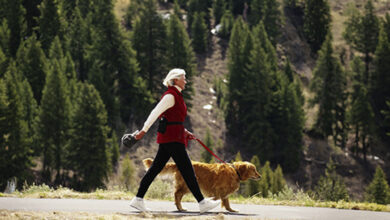
Owning a pet has well-documented health benefits, such as reducing blood pressure and improving mood. However, living with a senior pet can provide even greater rewards. While senior dogs typically enter their golden years between 10 and 12, larger breeds age faster, smaller breeds live longer, and senior cats are considered seniors at around 11 years old.
Living with a senior pet
Senior pets often require less physical activity than younger animals, making them ideal companions for those seeking a more relaxed pet for a family with a slower lifestyle. They are usually past destructive behavior stages and thrive on calm routines. Older pets are often house-trained, skipping the challenges of potty training, although it is essential to realize occasional accidents may still happen.
Owning a senior dog or cat can also help reduce life’s stresses. Like younger pets, seniors need regular feeding, maybe with specialty food, exercise, and veterinary checkups, as well as encouraging routine and promoting healthy outdoor activity. Walking your senior dog provides gentle exercise and fosters social interactions with neighbors, increasing the benefits of companionship.
Caring for senior pets
As pets age, they may develop health issues such as arthritis or cognitive decline. Gentle activities like slow walks, swimming, and massages can help ease their discomfort and help manage these possible conditions.
Medications and orthopedic pet beds are also effective in relieving pain. Keeping older dogs and cats mentally stimulated with new activities, toys, or tricks can delay cognitive decline and help them stay sharp and engaged. However, the cost of caring for a senior pet may be higher due to increased medical needs.

Support for senior pets in need
The Grey Muzzle Organization is the largest agency in the country that provides invaluable services for senior dogs in need. It provides grants to shelters and sanctuaries, pet food banks, medical care, dental services, and orthopedic services for senior pets. This incredible, compassionate organization ensures that older pets receive the attention they need as they age.

There is a growing and compassionate movement focused on rescuing senior and disabled animals from overcrowded shelters, where they often face euthanasia. Community groups and non-profit organizations like Dog Is My CoPilot are dedicated to transporting these vulnerable pets to shelters with more space, offering them a second chance at life. Thanks to volunteer pilots, many of these rescued animals are flown from overcrowded shelters in southern states to less crowded ones in the North. Additionally, a network of volunteer drivers works nationwide, helping transport homeless and foster animals to safer environments.
Some of these animals are placed in foster care until a permanent home is found. Foster families provide loving, temporary homes, helping the pets adjust to home environments and receive the attention and care they deserve. These dedicated volunteers often host adoption events to connect pets with potential owners, carefully screening them to ensure the best fit for the animals and their new families.
Fospice care: A final gift of love
For senior pets nearing the end of their lives, fospice care (a combination of foster and hospice) has emerged as a compassionate option. Fospice homes provide terminally ill pets with palliative care, ensuring comfort and quality of life in their final days. These pets spend their remaining time in loving environments, often with families who provide compassion and support.

Coping with the loss of a senior pet
One reality of pet ownership is that our pets’ lifespans are shorter than ours. When the time comes to say goodbye to a beloved pet, resources such as pet loss support groups and grief hotlines can provide emotional comfort.
The ASPCA National Pet Loss Hotline (877-474-3310) offers 24-hour support for grieving pet owners. To honor their pet, many memorialize their pets with keepsakes, such as garden stones or personalized mementos, celebrating the bond they shared.
Embracing a senior pet brings love, companionship, and countless rewards, while the proper care and support ensure they enjoy their golden years to the fullest.






